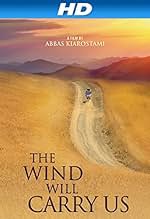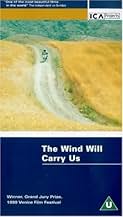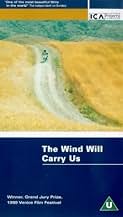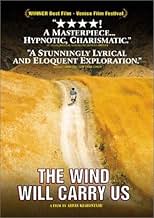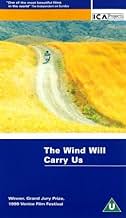CALIFICACIÓN DE IMDb
7.4/10
13 k
TU CALIFICACIÓN
Agrega una trama en tu idiomaIrreverent city engineer Behzad comes to a rural village in Iran to keep vigil for a dying relative. In the meanwhile the film follows his efforts to fit in with the local community and how ... Leer todoIrreverent city engineer Behzad comes to a rural village in Iran to keep vigil for a dying relative. In the meanwhile the film follows his efforts to fit in with the local community and how he changes his own attitudes as a result.Irreverent city engineer Behzad comes to a rural village in Iran to keep vigil for a dying relative. In the meanwhile the film follows his efforts to fit in with the local community and how he changes his own attitudes as a result.
- Premios
- 4 premios ganados y 7 nominaciones en total
- Dirección
- Guionistas
- Todo el elenco y el equipo
- Producción, taquilla y más en IMDbPro
Argumento
¿Sabías que…?
- TriviaThe title is a reference to a poem written by famous modern Iranian female poet Forough Farrokhzad.
- ErroresWhen the engineer is driving back from the mountain, he stops and picks up someone who is walking down the road and starts talking to him, but when the camera shows the car from long shot for the first time, there is no one in the car other than the engineer.
Opinión destacada
A man out of time finds the way back in. And so, too, do we. Films about such big subjects, metaphysical, quasi-metaphysical, or near metaphysical, can't afford to be petty. So this one meanders, lays a loose and light hand on its subject, finds and follows it by a process of mutual discovery, audience and film maker wandering an unknown road, led by faith in a final destination.
Three men journey from Tehran to a tiny remote village for purposes unknown. Contrasts evolve between their urban modernity and the ageless life of the rural village. They're ostensibly there for the funeral of an ancient woman, a stranger, not a relative, who confounds their expectations by not dying. Let's just say, for the sake preserving the mystery, that they're there, in a way, to cheat death, to rob the villagers of a ritual they themselves fail to understand.
By way of first person narration, the film centers on their leader (Behzad Dourani), a man who accepts being called "engineer," but really isn't--or is he? The perspective is doubled: The world of the film narrowly revolves around him at the same time that it doesn't, claustrophobically relating everything to his solitary universe, at the same time that it encompasses the full scope of a world independent of him, thus giving the lie to his limitations, his distortions and blindness. This is narrative executed with great skill, care, and a free imagination.
Forced to wait, idle and deprived of most of his customary modern distractions, his anxiety, emptiness, and his unease surface; this is a man out of time, who resists the present and fights against the future. His one connection to the outside world, a cell phone, requires every time it goes off that he drop whatever he's doing to run to his truck and drive up to a mountain-top cemetery for clear reception, an association of technology with death concurrent with its indifference to and alienation from it, a comical escapade repeated periodically throughout to give the film a rhythm, an intrusive repetitious beat that contrasts with the natural rhythms of the village.
With nothing else to do, he gradually is tugged by and eventually succumbs to the life around him. This is the kind of movie in which a shot is held so a rooster can walk across the frame. We, too, are made to wait. While waiting, stuck in a plotless limbo, all sorts of beautiful and instructive things emerge from an apparently banal reality, if one cares to notice. There is the unassuming visual poetry of the world, the shadows on a wall of a woman hanging clothes, rolling hills of golden grass, and the organic architecture of a village molded into a hillside; and the subtlety of social interactions: the tender trust of a young boy; the engineer's yearning for a pot of milk, which finally leads him into a primeval cave-like cellar alone with a fecund young woman who refuses his money; the casualness of the birth of a neighbor woman's 10th child; the shrewish complaints of a cafe proprietor, which are answered by one her customers with implacable peasant wisdom; and so on, one scene following upon another, small miracles falling into our laps unannounced.
If only this process of poetic inference, metaphor, indirection, and openness were in more widespread use, commonly adapted, thus more fully developed, instead of the literal dry analytic "objectivity" which tyrannizes modern fictions, nails meaning as if to a cross. Here there isn't even a hint of manipulation or exploitation, not a drop of didacticism. Instead, Kiarostami achieves the difficult feat of keeping water in cupped hands. The film teaches us to observe nature by observing nature.
Three men journey from Tehran to a tiny remote village for purposes unknown. Contrasts evolve between their urban modernity and the ageless life of the rural village. They're ostensibly there for the funeral of an ancient woman, a stranger, not a relative, who confounds their expectations by not dying. Let's just say, for the sake preserving the mystery, that they're there, in a way, to cheat death, to rob the villagers of a ritual they themselves fail to understand.
By way of first person narration, the film centers on their leader (Behzad Dourani), a man who accepts being called "engineer," but really isn't--or is he? The perspective is doubled: The world of the film narrowly revolves around him at the same time that it doesn't, claustrophobically relating everything to his solitary universe, at the same time that it encompasses the full scope of a world independent of him, thus giving the lie to his limitations, his distortions and blindness. This is narrative executed with great skill, care, and a free imagination.
Forced to wait, idle and deprived of most of his customary modern distractions, his anxiety, emptiness, and his unease surface; this is a man out of time, who resists the present and fights against the future. His one connection to the outside world, a cell phone, requires every time it goes off that he drop whatever he's doing to run to his truck and drive up to a mountain-top cemetery for clear reception, an association of technology with death concurrent with its indifference to and alienation from it, a comical escapade repeated periodically throughout to give the film a rhythm, an intrusive repetitious beat that contrasts with the natural rhythms of the village.
With nothing else to do, he gradually is tugged by and eventually succumbs to the life around him. This is the kind of movie in which a shot is held so a rooster can walk across the frame. We, too, are made to wait. While waiting, stuck in a plotless limbo, all sorts of beautiful and instructive things emerge from an apparently banal reality, if one cares to notice. There is the unassuming visual poetry of the world, the shadows on a wall of a woman hanging clothes, rolling hills of golden grass, and the organic architecture of a village molded into a hillside; and the subtlety of social interactions: the tender trust of a young boy; the engineer's yearning for a pot of milk, which finally leads him into a primeval cave-like cellar alone with a fecund young woman who refuses his money; the casualness of the birth of a neighbor woman's 10th child; the shrewish complaints of a cafe proprietor, which are answered by one her customers with implacable peasant wisdom; and so on, one scene following upon another, small miracles falling into our laps unannounced.
If only this process of poetic inference, metaphor, indirection, and openness were in more widespread use, commonly adapted, thus more fully developed, instead of the literal dry analytic "objectivity" which tyrannizes modern fictions, nails meaning as if to a cross. Here there isn't even a hint of manipulation or exploitation, not a drop of didacticism. Instead, Kiarostami achieves the difficult feat of keeping water in cupped hands. The film teaches us to observe nature by observing nature.
- simuland
- 30 sep 2000
- Enlace permanente
Selecciones populares
Inicia sesión para calificar y agrega a la lista de videos para obtener recomendaciones personalizadas
- How long is The Wind Will Carry Us?Con tecnología de Alexa
Detalles
- Fecha de lanzamiento
- País de origen
- Sitio oficial
- Idiomas
- También se conoce como
- The Wind Will Carry Us
- Locaciones de filmación
- Productora
- Ver más créditos de la compañía en IMDbPro
Taquilla
- Total en EE. UU. y Canadá
- USD 259,510
- Fin de semana de estreno en EE. UU. y Canadá
- USD 21,417
- 30 jul 2000
- Total a nivel mundial
- USD 259,510
Contribuir a esta página
Sugiere una edición o agrega el contenido que falta

Principales brechas de datos
By what name was El viento nos llevará (1999) officially released in India in English?
Responda
